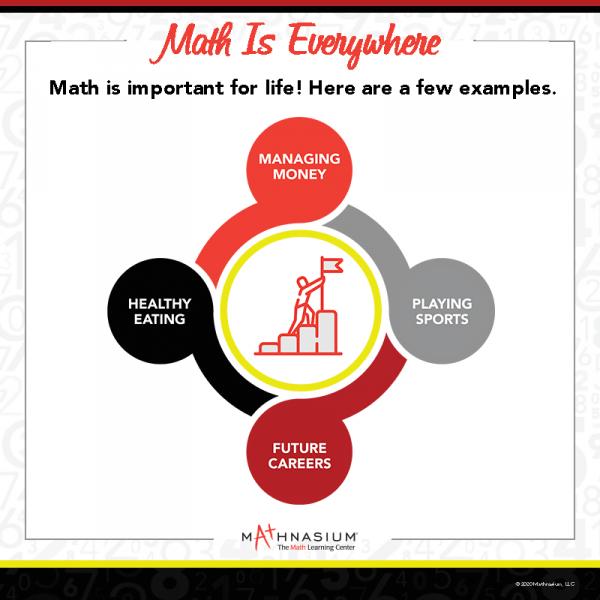The language of the universe, math is omnipresent and unavoidable — and that’s a good thing.
Math is a universal tool that helps our children thrive. From the earliest years, when parents show children the importance of sharing (dividing) with others, they are also teaching them math. As they get older, though, children often ask, “When will I use math in real life?” The answer to them should be, “Every day!” Children need to develop a strong math foundation early to help them through school, future careers, and throughout every aspect of their lives.
Let’s start with school. Children must take math each year until high school, where they’re required to take between two and four years of math, depending on their state or school district. Children who stop after two year or three years, though, are at a disadvantage, because all college entrance exams measure for math ability. Unless a college is “test optional,” that math score will weigh heavily into both their admissions and scholarship decisions. Additionally, colleges look favorably upon students who have challenged themselves by taking more advanced math classes.
The need for math continues once they get to college. Because math is widely considered necessary to develop well-rounded thinkers and citizens, most four-year colleges have a math or “quantitative thinking” requirement in order to graduate. The required math classes may be different for a student studying STEM versus the arts or business. But it’s important to recognize as early as high school — when students can still choose to take that extra year of math — that pursuing psychology or sociology (for example) means taking math in college.
By taking more math in high school and college, students keep their career options wide-open. So many careers incorporate math in some way: doctor, marine biologist, engineer, ship’s captain, even artist — the list is never-ending! According to the Georgetown University Public Policy Institute, most occupations require mathematical knowledge to be successful. (To read examples of how math is used in different careers, read our Cool Careers Using Math articles.) Math is also growing in importance in the competitive job market.
School and careers aside, so many young people — and their parents — don’t understand how they already use math all the time. Math is critical to success in problem-solving and critical thinking, and it’s an intrinsic part of language, spatial, directional and memory skills. Here are a few more examples.
Managing Money: We count dollars and cents. Algebra helps us plan our finances. The concepts of principal and interest are key to buying a car or a house. Earning, saving, retirement planning — it’s all math.
Playing Sports: Math helps us keep track of sports scores and statistics. Geometry and trigonometry help us find the best way to hit a baseball, make a basket or jump over hurdles.
Eating Healthy: We count calories and grams of carbs or fats. We take nutritional supplements that add up to 100% of our recommended daily requirements. We use proportions and ratios when we double or halve a recipe or an ingredient.
Enjoying Music: Music is fundamentally mathematical. Our brains appreciate pitch, chords, balance and so on through an unconscious mathematical understanding. As philosopher and mathematician Gottfried Leibniz said, “Music is the pleasure the human mind experiences from counting without being aware that it is counting.”
Creating/Enjoying Art: From Leonardo Da Vinci to gorgeous tile mosaics in medieval Islamic buildings, art and math have always been inextricably intertwined. English mathematician G. H. Hardy likened painters and poets to mathematicians because they are all pattern-seekers. (Mathematics is sometimes called the “science of patterns.”)
Parents, you play an important role in helping children to recognize and practice math in their daily lives. It starts by recognizing that math is everywhere, all the time, and that “mathing” with your child is just as important as reading with them. Rather than avoid math, children who learn to embrace math will have a future of unlimited possibility. Talk to your local Mathnasium Learning Center anytime about the many ways you can explore math together with your child.

















